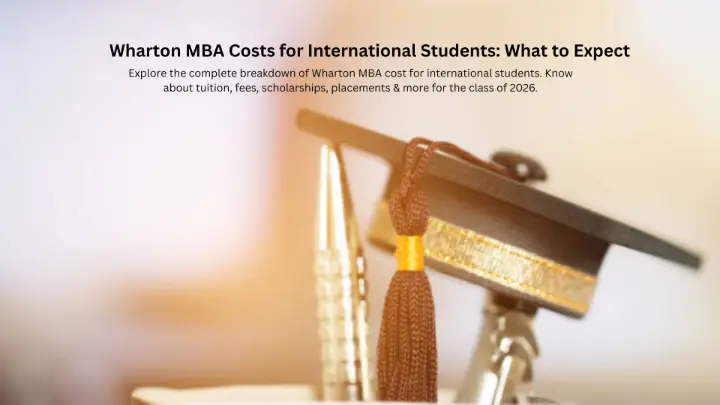
Pursuing an MBA from a prestigious business school like the Wharton School of the University of Pennsylvania is a dream for many global aspirants. However, along with academic prestige comes a significant financial investment. Understanding the Wharton MBA cost is crucial for international students planning to apply for the Wharton MBA program.
In this comprehensive guide, we’ll explore the total Wharton MBA tuition fees for 2025, additional expenses, funding options, Wharton MBA scholarships, and what international students can expect in terms of ROI through Wharton MBA placements.
Understanding the Wharton MBA Tuition Fees 2025
For the academic year 2025-2026, the Wharton MBA tuition fees are expected to be around $87,370 annually. For the entire two-year Wharton MBA program, the Wharton MBA cost climbs to approximately $174,740—just the tuition component.
But tuition is only a portion of the total expenses. The overall cost of attendance includes additional mandatory fees, health insurance, books, supplies, and living expenses. When all these are factored in, the total Wharton MBA fees for international students can reach $230,000 to $240,000 for two years.
Breakdown of Wharton MBA Cost for International Students
Here’s what makes up the estimated full cost:
- Tuition (2025-2026): $87,370/year
- Mandatory Fees: $2,000/year
- Health Insurance: $4,000/year
- Living Expenses: $26,000–$28,000/year
- Books & Supplies: $2,000/year
- Miscellaneous: $3,000/year
Total Estimated Cost (2 Years): $230,000 – $240,000
These estimates vary depending on personal lifestyle, housing choices, and currency fluctuations for international students.
Wharton MBA Scholarships and Financial Aid
Despite the high Wharton MBA tuition fees, the school offers robust financial support. Wharton MBA scholarships are merit-based and awarded during the admission process itself. There's no need for a separate application.
Scholarship amounts range from $20,000 to full tuition, helping ease the burden for talented international students. Additionally, students can explore external scholarships, fellowships, and even Wharton MBA loans that don’t require a U.S.-based co-signer, such as those offered by Prodigy Finance or MPOWER.

Wharton also offers the Wharton Fellowship Program, and special interest scholarships such as the Joseph Wharton Fellowship, Emerging Economy Fellowship, and Social Impact Fellowship.
Wharton MBA Class Profile and Diversity
When deciding whether the Wharton MBA cost is worth it, it's important to consider the peer network. The Wharton MBA class profile reveals impressive diversity and academic excellence. The Wharton MBA class of 2026 is expected to maintain this trend with:
- Over 35% international students from more than 70 countries
- Average GMAT score: 733
- Average work experience: 5 years
- Gender diversity: Nearly 50% women
Being part of such a global cohort offers unmatched networking and learning opportunities—critical to a positive ROI on your investment.
ROI Through Wharton MBA Placements
One of the biggest reasons international students are willing to bear the Wharton MBA cost is the program’s placement record. The Wharton MBA placements are among the best globally, with graduates landing jobs in top firms across consulting, finance, tech, and entrepreneurship.
For the most recent class, the median base salary was around $175,000, with sign-on bonuses averaging $30,000. Additionally, many students received stock options, relocation packages, and performance bonuses.
Employers hiring Wharton graduates include:
- McKinsey & Company
- Bain & Company
- Boston Consulting Group
- Goldman Sachs
- Amazon
- Meta
The strong alumni network and on-campus recruiting ensure that international students have solid opportunities despite visa-related challenges.
Wharton MBA Requirements for International Students
To gain admission to a program with such a strong brand and ROI, applicants must meet rigorous Wharton MBA requirements. These include:

- A competitive GMAT or GRE score
- TOEFL or IELTS for non-native English speakers
- Minimum 2 years of work experience (average is 5)
- Strong essays, resume, and letters of recommendation
- A compelling interview performance
Wharton also values leadership, global exposure, and demonstrated impact in applicants’ past roles.
Wharton MBA Acceptance Rate: Competitive but Achievable
The Wharton MBA acceptance rate hovers around 22-23%, making it one of the more selective business schools. However, strong international profiles with diverse experience and a clear career vision have a good shot at admission—especially when backed by solid GMAT scores and impactful applications.
Wharton also places importance on holistic evaluation, looking beyond numbers to assess leadership potential, cultural contribution, and community involvement.
Is the Wharton MBA Cost Worth It?
When considering a $230K investment, the question naturally arises: Is it worth it?
For most international students, the answer is yes. The global brand recognition, access to elite recruiters, high average salaries, lifelong alumni connections, and leadership grooming offered by the Wharton MBA program justify the cost.
Moreover, with Wharton MBA scholarships and loan options, financing the program becomes more manageable. Within 3–5 years post-graduation, most international graduates recover their initial investment and start reaping long-term benefits—professionally and personally.
Final Thoughts
The Wharton MBA cost may seem steep, but it opens doors to a world of opportunities. For international students, it’s not just about earning a degree—it’s about accessing one of the most influential business networks in the world, gaining transformative experiences, and accelerating their careers on a global scale.
Before applying, evaluate the Wharton MBA requirements, explore financing options, and consider the potential ROI. With thorough planning and a strong application, the journey from applicant to Wharton MBA graduate can be life-changing.